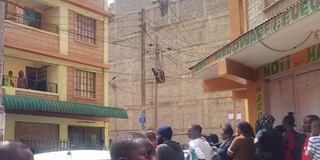Surge in femicide demands urgent, unapologetic action

Residents of Kasarani look on as police arrive at an apartment along TRM Drive where a woman was found murdered and her body hacked to pieces.
In the past few weeks, Kenya has been forced to confront a heart-wrenching reality, a surge in femicide that has left us grappling with the brutal loss of young lives. The tragic story of Starlet Wahu, a woman seeking love in a digital world, unfolded in a horrifying echo of demise.
Her life was cut short by the hands of a man she trusted. Wahu’s lifeless body was discovered on the fourth floor of an Airbnb in South B on January 4, the alleged perpetrator, John Matara Ongoa, now in custody, not only faces accusations of Wahu's murder but is also accused of violating and harassing other women, demanding not only their bodies but their money. This unsettling pattern of violence against women demands our undivided attention, not just as a societal issue but as a deeply personal threat to every woman.
In a country where women should feel secure, the recent femicides underscore a frightening vulnerability. It prompts a crucial examination of the security of women in intimate settings and the role of law enforcement in preventing such events. We demand more than just a resolution to these crimes; we need a proactive approach to ensure our safety.
The law enforcement agencies, in particular, need to reevaluate and strengthen their strategies. The fact that Matara could escape the crime scene, leaving behind a trail of blood, raises unsettling questions about the responsiveness of our police service. The crucial role of initiatives like Policare and the significance of specialised police gender desks donated by NGOs such as IMLU and Fida, cannot be overstated.
The gender desks must not remain dormant; instead, law enforcement agencies should actively employ them with the necessary staffing, training, and resources to effectively address cases of violence against women. Policare, envisioned as a comprehensive support mechanism, should evolve from a conceptual framework to an operational entity that provides tangible assistance to victims. The time has come for a proactive response, ensuring that these resources translate into real, impactful measures to safeguard the lives of women in Kenya. Top of Form We, as women, deserve more than just a reactionary response; we demand a commitment to our safety.
Equally crucial is the role of the Judiciary and the Office of the Director of Public Prosecutions (ODPP) in holding perpetrators accountable. Matara’s alleged history of violence against women must not be brushed aside. It is a glaring indication that our legal system must do more to protect potential victims. Swift, unyielding action is required to ensure that those with a record of violence face the full consequences of the law. Delays in justice only perpetuate a culture of impunity. In June last year, the President of our apex court launched the Convicted Sexual Offenders’ Electronic Register, in alignment with the Sexual Offences Act of 2006.
The register will ensure that perpetrators such as John Matara, if convicted, have their sexual offence records highlighted. Moreover, the President inaugurated four specialized SGBV Courts in Nairobi, Siaya, Kisumu, and Mombasa, the only such courts among the 47 counties. All counties need these courts to ensure swift, dignified and a trauma-responsive justice system.
We must also acknowledge the constitutional rights that should shield us from harm. The Constitution unequivocally guarantees the right to life and security, and its time these rights become more than just words on paper. The constitution must be a formidable deterrent against gender-based violence, ensuring that the perpetrators understand that their actions will not go unpunished.
To truly address the root of this issue, a cultural shift is paramount. Educational campaigns on consent, healthy relationships, and respect should be a constant presence in our schools and communities. Breaking the silence around domestic violence and encouraging victims to speak up without fear of retribution is a vital step towards change. Men, too, must be engaged as allies, challenging toxic masculinity and promoting a culture of mutual respect and equality.
The recent surge in femicide demands urgent, unapologetic action. As women, we could easily find ourselves in the shoes of Wahu, we refuse to be silent witnesses to our vulnerability. We demand that the police be proactive, the judiciary and ODPP be swift, and the constitution be a beacon of protection. This is not just a fight for justice; it's a demand for a society where the safety of women is non-negotiable. The time for reckoning is now, and as women, we will not be silenced until our call for change is heard and heeded.
Ms Nyakio is a communications practitioner and human rights defender: [email protected]; Ms Kavutha is an Advocate of the High Court of Kenya and a human rights champion: [email protected]






